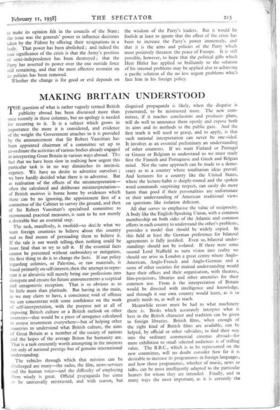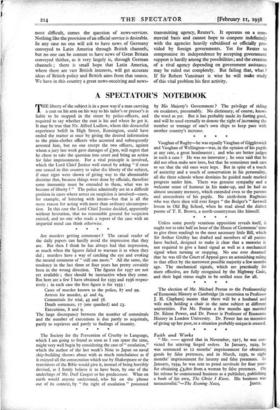MAKING BRITAIN UNDERSTOOD
THE question of what is rather vaguely termed British publicity abroad has been discussed more than once recently in these columns, but no apology is needed for recurring to it. It is a subject which grows in importance the more it is considered, and evidence of the weight the Government attaches to it is provided by the announcement that Sir Robert Vansittart has been appointed chairman of a committee set up to co-ordinate the activities of various bodies already engaged in interpreting Great Britain in various ways abroad. The fact that we have been slow in realising how urgent this particular task is in no way diminishes its intrinsic urgency. We have no desire to advertise ourselves ; we have hardly decided what there is to advertise. But as realisation of the effects of the misinterpretation— often the calculated and deliberate misinterpretation— of British motives is borne home by evidences which there can be no ignoring, the appointment first of a committee of the Cabinet to survey the ground, and then of Sir Robert Vansittart's specialised committee to recommend practical measures, is seen to be not merely a desirable but an essential step.
The task, manifestly, is twofold—to decide what we want foreign countries to believe about this country and to find means of persuading them to believe it. If the tale is not worth telling then nothing could be more fatal than to try to tell• it. If the essential facts cannot be presented without embroidery or mitigation, the first thing to do is to change the facts. If our policy regarding colonies, or Palestine, or raw materials, is based primarily on self-interest, then the attempt to repre- sent it as altruistic will merely bring our professions into disrepute and ensure for future announcements a sceptical and antagonistic reception. That is so obvious as to be little more than platitude. But having in the main, as we may claim to have, a conscience void of offence we can concentrate with some confidence on the work of self-interpretation, with the purpose not at all of imposing British culture or a British outlook on other countries—that would be a piece of arrogance calculated to arouse resentment everywhere—but of helping other countries to understand what British culture, the aims of Great Britain as a member of the society of nations and the hopes of the average Briton for humanity are. That is a task eminently worth attempting in the interests not only of national prestige but of genuine international understanding.
The vehicles through which that mission can be discharged are many—the radio, the film, news-services and the human voice—and the difficulty of employing them wisely is great. Official propaganda has come to be universally mistrusted, and with reason, but disguised propaganda is likely, when the disguise is penetrated, to be mistrusted more. The new com- mittee, if it reaches conclusions and produces plans, will do well to announce them openly and expose both its aims and its methods to the public gaze. And the first truth it will need to grasp, and to apply, is that such national interpretation' can never be one-sided. It involves as an essential preliminary an understanding of other countries. If we want Finland or Portugal or Greece or Belgium to understand us we must study first the Finnish and Portuguese and Greek and Belgian mind. Not the same approach can be made to a demo- cracy as to a country where totalitarian ideas prevail. And lecturers for a country like the United States, where the lecture-habit is deeply-rooted and the spoken word commands surprising respect, can easily do more harm than good if their personalities are unfortunate or their understanding of American traditional views on questions like isolation deficient.
All that serves to emphasise the value of reciprocity. A body like the English-Speaking Union, with a common membership on both sides of the Atlantic and common efforts in each country to understand the other's problems, provides a model that should be widely copied. In this field at least the German preference for bilateral agreements is fully justified. Even so, bilateral under- standings should not be isolated. If there were some second Lord Nuffield to turn vision into reality we should see arise in London a great centre where Anglo- American, Anglo-French and Anglo-German and a score of other societies for mutual understanding would have their offices and their organisation, with theatres, film-projectors, libraries and other amenities for their common use. From it the interpretation of Britain would be directed with intelligence and knowledge, and through it our own country would learn, as it so greatly needs to, as well as teach.
Meanwhile resort must be had to what machinery there is. Books which accurately interpret what is best in the British character and tradition can be given to foreign libraries. British films, when enough of the right kind of British films are available, can be helped, by official or other subsidies, to find their way into the ordinary commercial cinemas abroad—for mere exhibition to small selected audiences is of trifling value. The B.B.C., which is to be represented on the new committee, will no doubt consider how far it is desirable to increase its programmes in foreign languages, and how those programmes, whether of music, news or talks, can be most intelligently adapted to the particular hearers for whom they are intended. Finally, and in many ways the most important, as it is certainly the most difficult, comes the question of news-services. Nothing like the provision of an official service is desirable. In any case no one will ask to have news of Germany conveyed to Latin America through British channels, but no one can be content to have news of Great Britain conveyed thither, as it very largely is, through German channels ; there is small hope that Latin America, where there are vast British interests, will get accurate ideas of British policy and British aims from that source. We have in this country a great news-receiving and news- transmitting agency, Reuter's. It operates on a com- mercial basis and cannot hope to compete indefinitely with the agencies heavily subsidised or officially pro- vided by foreign governments. Yet for Reuter to compromise its independence by accepting government support is hardly among the possibilities ; and the creation of a rival agency depending on government assistance may be ruled out completely. But failing that, what ? If Sir Robert Vansittart is wise he will make study of this vital problem his first activity.



















































 Previous page
Previous page